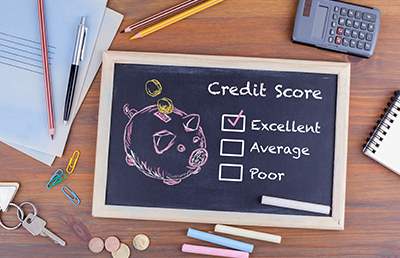Business owners know that credit scores can greatly affect the things they can and can’t afford to do with their business. It can mean the difference between being able to get the equipment you need to grow and not. Have you ever wondered what the difference between business and personal credit is? What factors go into determining your credit score? Why do credit scores vary across credit bureaus? How do I improve my credit score? In this two-part series, you’ll read about the ins and outs of credit scores and how they affect you and your business.
Personal Credit v. Business Credit
Knowing the differences and similarities between your personal credit and your business credit is the first step in using them to your advantage. You can take a lot of the knowledge you already have about your personal credit, and apply that to your business credit.
Your personal credit score, or FICO score, is a direct reflection of your ability to pay a debt. And guess, what? The same goes for your business credit, too. Things like how your business pays its bills, how much debt you carry, and what type of industry you’re in also affect your business credit, and determine your business’ overall creditworthiness. Monitoring and nurturing both types of credit is important. The higher your score, the more likely lenders are to give you and your business credit.

Credit scores are calculated based on information reported to credit bureaus. When you apply for a personal credit card, the lender extending you the credit reports that to the bureau, and it is then reflected in your credit history. This is then applied to your business’ credit, but there’s a twist. Not all of the lenders and suppliers who extend credit to your business are required by the same rules to report this information to a credit bureau, so that particular lender may be missing from your business credit altogether. Encouraging your vendors and suppliers to report this information can go a long way in helping to boost your business credit score.
Separating personal credit and business credit can be tricky. Oftentimes in a small business, you are the business. However, maintaining a distinction between your credit and your business’ credit is vital to the health of both. According to Experian, many creditors are shifting away from relying on personal credit alone when assessing a business, because personal credit is not an ideal predictor of your business’ behavior. Keeping personal and business credit separate will protect both you and your business should one of you fall on hard times.
Factors that Make Up Your Credit Score
Credit scores change. And they change frequently because they are calculated in real-time The three main credit bureaus who report on business credit – Dun & Bradstreet, Experian, and Equifax – all report their own scores, and these scores can vary (we’ll get into why this is in Part 2 of this series). However, the criteria that each bureau looks at when factoring your business credit score is very similar from one bureau to another.

To calculate a credit score, you need two things: credit data and a scoring model. But what kinds of credit data do bureaus needs? They look at a wide variety of factors that go beyond just whether or not you pay your bills on time – like how much credit has been extended to your business, and how much of that credit has a rotating balance from month to month. They look at the length of time your business has had a credit profile and how many inquiries into your credit profile are made. After all this information is collected, it’s then applied to the scoring model. Think of the credit model as a machine – all the information goes in, and out pops your credit score. The actual degree of importance, or weight, applied to each criterion is where each bureau differs.
While it may sound like a daunting task to monitor all the data that goes into your business credit score, it’s too important to ignore. As mentioned earlier, encouraging lenders to report to the credit bureaus can positively affect your score. Also, ensuring accuracy in your business credit report is vital – in most cases you can correct these errors by contacting the bureaus and providing evidence that the information is inaccurate.
Now you know the differences between your personal credit and business credit – and the importance in keeping them separate. You also know what data the bureaus look at when calculating your score. In the next installment, we’ll help you dive deeper into exactly why scores can vary from one credit bureau to another, and deliver a ton of tips on how to improve your credit score.